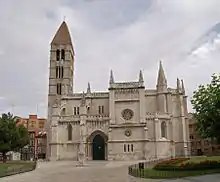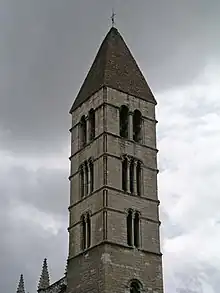| Iglesia de Nuestra Señora de la Antigua Church of Our Lady of the Antique | |
|---|---|
 View of the church. | |
| Religion | |
| Affiliation | Roman Catholic |
| District | Valladolid |
| Status | Active |
| Location | |
| Location | |
| Geographic coordinates | 41°39′25″N 4°43′28″W / 41.6570°N 4.7245°W |
| Architecture | |
| Style | Isabelline Gothic (Gothic), Renaissance |
| Completed | 1088-1952 |
| Official name: Iglesia de Santa María La Antigua | |
| Type | Monument |
| Designated | 08-05-1897 |
| Reference no. | RI-51-0000077 |
The Church of Saint Mary the Ancient (Spanish: Santa María La Antigua) is a 12th-century church in Valladolid, central Spain. It was declared Bien de Interés Cultural in 1897.
History

Under the current building foundations have been found remains of a Roman hypocaustum . The church was likely founded in 1095 by Count Pedro Ansúrez, although there are no remains of this original structure. The oldest parts of the current temple date to the late 12th century: the gallery in the northern side of the building and the tower, both in Romanesque style. The tower, one of the symbols of Valladolid, has four floors, the upper three featuring windows, and a pyramidal top.
The naves and sanctuary of the church were rebuilt in the 14th century in Gothic style, following the style of Burgos Cathedral. The church has three aisles, with three polygonal apses and a transept. The nave and the aisles are rib vaulted.
Due to a poor design and construction and the increasing size of the parish population, the building underwent successive additions and reparations: in the mid-16th century, architect Rodrigo Gil de Hontañón restored the collapsing building, adding buttresses and several windows.
Also from this period date the high altar retablo, by Juan de Juni (1550-1562; now in the Valladolid Cathedral). Several Baroque altarpieces were executed for the church's interior during the 17th and 18th centuries, hiding the original Gothic appearance.
In the early 20th century the building was extensively restored and rebuilt in order to show its original Romanesque-Gothic appearance, following the doctrines of the French architect Eugène Emmanuel Viollet-le-Duc.
Gallery
._Fachada.jpg.webp) in the present
in the present Santa María Antigua in 1823 by Edward Hawke Locker
Santa María Antigua in 1823 by Edward Hawke Locker early 20th century
early 20th century.jpg.webp) at 1950s
at 1950s.jpg.webp) at 1980s
at 1980s at night
at night view
view Portugalete Square
Portugalete Square Front view of La Antigua Church in a misty winter night
Front view of La Antigua Church in a misty winter night Side view of 2014
Side view of 2014